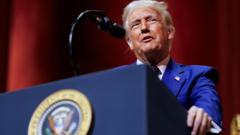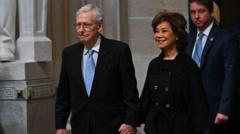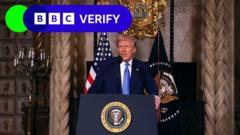The agreement signals a potential easing of trade tensions, but comes with conditions and a commitment to improve efforts against fentanyl trafficking.
**Canadian Tariffs Postponed After Key Discussions Between Trudeau and Trump**

**Canadian Tariffs Postponed After Key Discussions Between Trudeau and Trump**
Canada gains a temporary reprieve from U.S. tariffs as Trudeau strikes a deal with Trump focused on border security and opioid crisis management.
The Ambassador Bridge, where $400 billion in trade crosses between Canada and the U.S. each year, in Windsor, Canada. Credit...Ian Willms for The New York Times
On February 3, 2025, Prime Minister Justin Trudeau and President Donald J. Trump held a significant phone conversation that resulted in a crucial 30-day postponement of imminent U.S. tariffs on Canadian exports. This delay came just hours before the tariffs were due to be implemented, showcasing the urgency and importance of the negotiations for both nations.
In their discussion, Trudeau had initially threatened retaliatory tariffs against U.S. goods in response to the proposed measures. However, after talks with Trump, Canada agreed to take substantial actions aimed at enhancing border security and addressing the trafficking of fentanyl, which has emerged as a pressing issue affecting both countries. Trudeau announced plans to station 10,000 additional border personnel and to create a new position dedicated to combating fentanyl trafficking.
Trudeau shared his satisfaction with the call, stating, “I just had a good call with President Trump.” He emphasized that they would work collaboratively over the next month to address the tariff situation. While this agreement has brought temporary relief, it highlights ongoing efforts to bridge gaps in border policy and manage the drug crisis.
As part of the deal, Canada committed 200 million Canadian dollars to enhance intelligence efforts related to fentanyl trafficking and recognized drug cartels and gangs as terrorist organizations. This aligns with Trump's stance on combating the opioid crisis within the U.S. Moreover, a significant budget of 1.3 billion Canadian dollars has been pledged for border security enhancements, including the use of advanced surveillance technology and increased personnel.
While this temporary agreement seeks to stabilize trade between the two close allies, the 30-day window suggests that further negotiations and potential challenges loom ahead. The next steps will likely depend on the actions taken within this timeframe regarding border security and drug trafficking prevention.
On February 3, 2025, Prime Minister Justin Trudeau and President Donald J. Trump held a significant phone conversation that resulted in a crucial 30-day postponement of imminent U.S. tariffs on Canadian exports. This delay came just hours before the tariffs were due to be implemented, showcasing the urgency and importance of the negotiations for both nations.
In their discussion, Trudeau had initially threatened retaliatory tariffs against U.S. goods in response to the proposed measures. However, after talks with Trump, Canada agreed to take substantial actions aimed at enhancing border security and addressing the trafficking of fentanyl, which has emerged as a pressing issue affecting both countries. Trudeau announced plans to station 10,000 additional border personnel and to create a new position dedicated to combating fentanyl trafficking.
Trudeau shared his satisfaction with the call, stating, “I just had a good call with President Trump.” He emphasized that they would work collaboratively over the next month to address the tariff situation. While this agreement has brought temporary relief, it highlights ongoing efforts to bridge gaps in border policy and manage the drug crisis.
As part of the deal, Canada committed 200 million Canadian dollars to enhance intelligence efforts related to fentanyl trafficking and recognized drug cartels and gangs as terrorist organizations. This aligns with Trump's stance on combating the opioid crisis within the U.S. Moreover, a significant budget of 1.3 billion Canadian dollars has been pledged for border security enhancements, including the use of advanced surveillance technology and increased personnel.
While this temporary agreement seeks to stabilize trade between the two close allies, the 30-day window suggests that further negotiations and potential challenges loom ahead. The next steps will likely depend on the actions taken within this timeframe regarding border security and drug trafficking prevention.




















